Professional Development: Evaluation and Reflection Using Gibbs Model
VerifiedAdded on 2021/04/24
|31
|7645
|55
Report
AI Summary
This report presents an evaluation and reflection using the Gibbs Reflective Model, focusing on personal experiences and their impact on professional development. The author uses the model to analyze various situations, including interactions with colleagues and personal reactions to workplace challenges. The report describes specific instances of empathetic behavior, anger management issues, and lack of patience, detailing feelings, evaluations, and potential actions for future improvement. The analysis highlights both positive and negative aspects of the author's behavior, drawing conclusions about personal strengths and weaknesses. The author concludes by summarizing the key takeaways and outlining plans for self-improvement, including strategies for managing anger, enhancing patience, and maintaining a caring approach. The report references several academic sources to support the analysis.
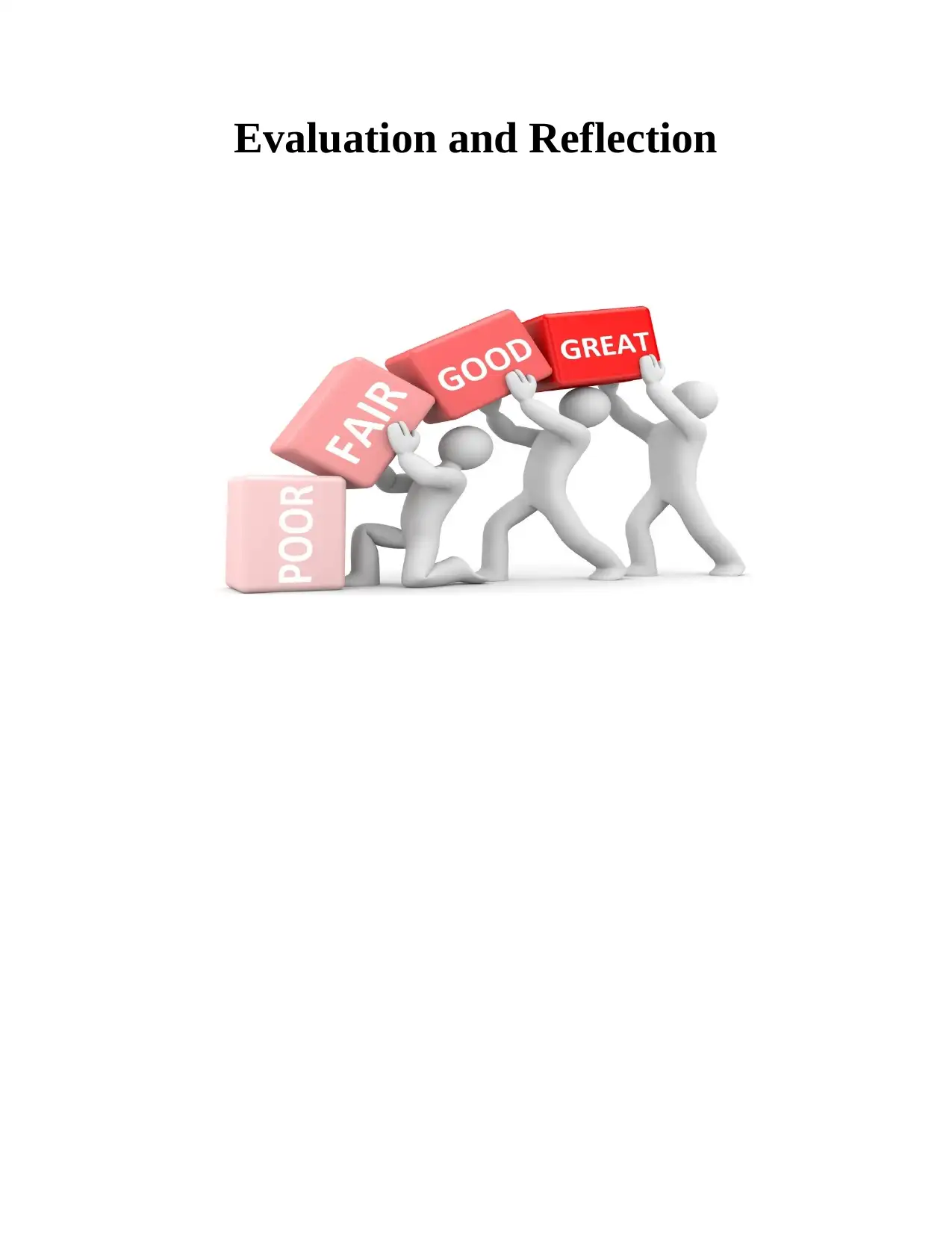
Evaluation and Reflection
Paraphrase This Document
Need a fresh take? Get an instant paraphrase of this document with our AI Paraphraser
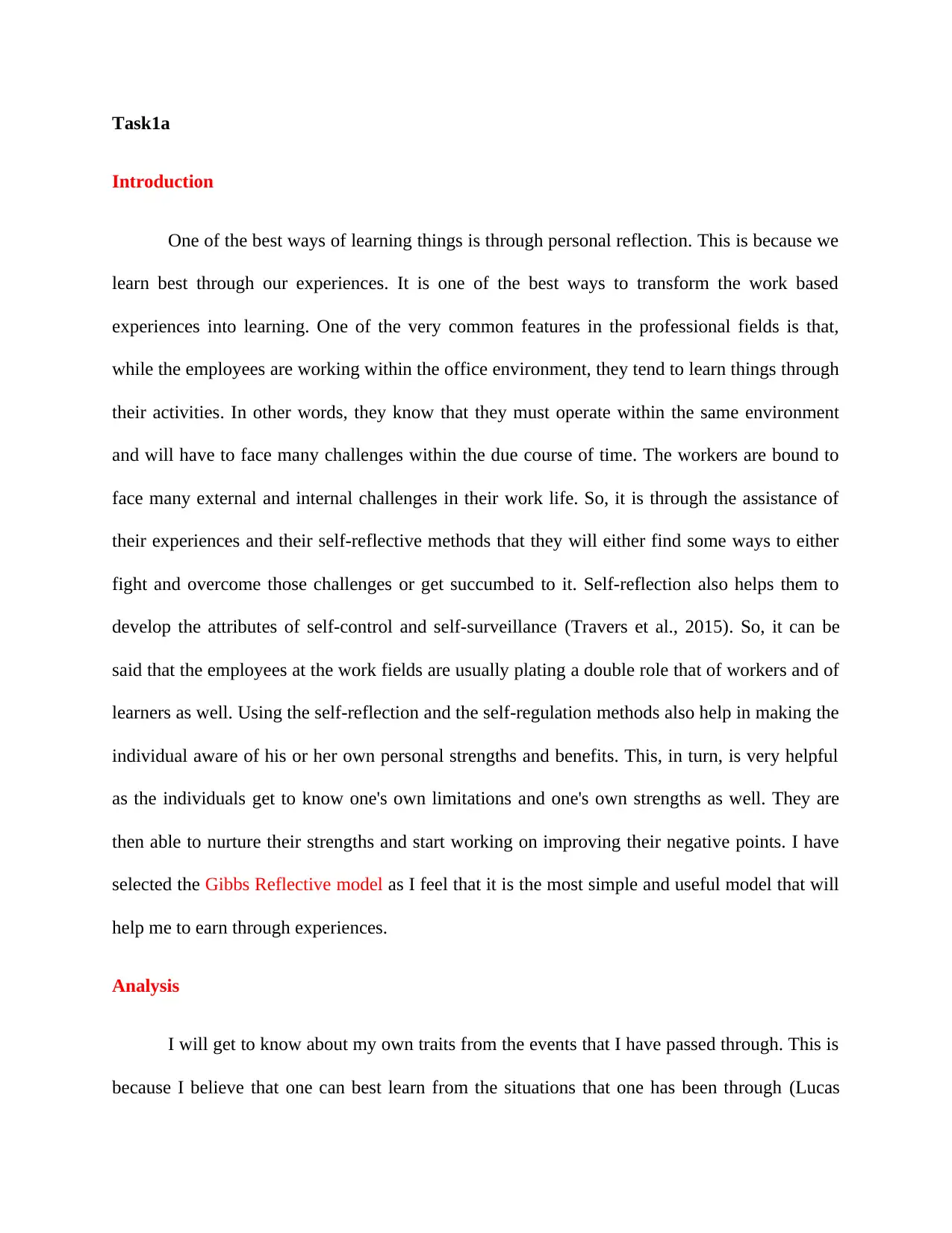
Task1a
Introduction
One of the best ways of learning things is through personal reflection. This is because we
learn best through our experiences. It is one of the best ways to transform the work based
experiences into learning. One of the very common features in the professional fields is that,
while the employees are working within the office environment, they tend to learn things through
their activities. In other words, they know that they must operate within the same environment
and will have to face many challenges within the due course of time. The workers are bound to
face many external and internal challenges in their work life. So, it is through the assistance of
their experiences and their self-reflective methods that they will either find some ways to either
fight and overcome those challenges or get succumbed to it. Self-reflection also helps them to
develop the attributes of self-control and self-surveillance (Travers et al., 2015). So, it can be
said that the employees at the work fields are usually plating a double role that of workers and of
learners as well. Using the self-reflection and the self-regulation methods also help in making the
individual aware of his or her own personal strengths and benefits. This, in turn, is very helpful
as the individuals get to know one's own limitations and one's own strengths as well. They are
then able to nurture their strengths and start working on improving their negative points. I have
selected the Gibbs Reflective model as I feel that it is the most simple and useful model that will
help me to earn through experiences.
Analysis
I will get to know about my own traits from the events that I have passed through. This is
because I believe that one can best learn from the situations that one has been through (Lucas
Introduction
One of the best ways of learning things is through personal reflection. This is because we
learn best through our experiences. It is one of the best ways to transform the work based
experiences into learning. One of the very common features in the professional fields is that,
while the employees are working within the office environment, they tend to learn things through
their activities. In other words, they know that they must operate within the same environment
and will have to face many challenges within the due course of time. The workers are bound to
face many external and internal challenges in their work life. So, it is through the assistance of
their experiences and their self-reflective methods that they will either find some ways to either
fight and overcome those challenges or get succumbed to it. Self-reflection also helps them to
develop the attributes of self-control and self-surveillance (Travers et al., 2015). So, it can be
said that the employees at the work fields are usually plating a double role that of workers and of
learners as well. Using the self-reflection and the self-regulation methods also help in making the
individual aware of his or her own personal strengths and benefits. This, in turn, is very helpful
as the individuals get to know one's own limitations and one's own strengths as well. They are
then able to nurture their strengths and start working on improving their negative points. I have
selected the Gibbs Reflective model as I feel that it is the most simple and useful model that will
help me to earn through experiences.
Analysis
I will get to know about my own traits from the events that I have passed through. This is
because I believe that one can best learn from the situations that one has been through (Lucas
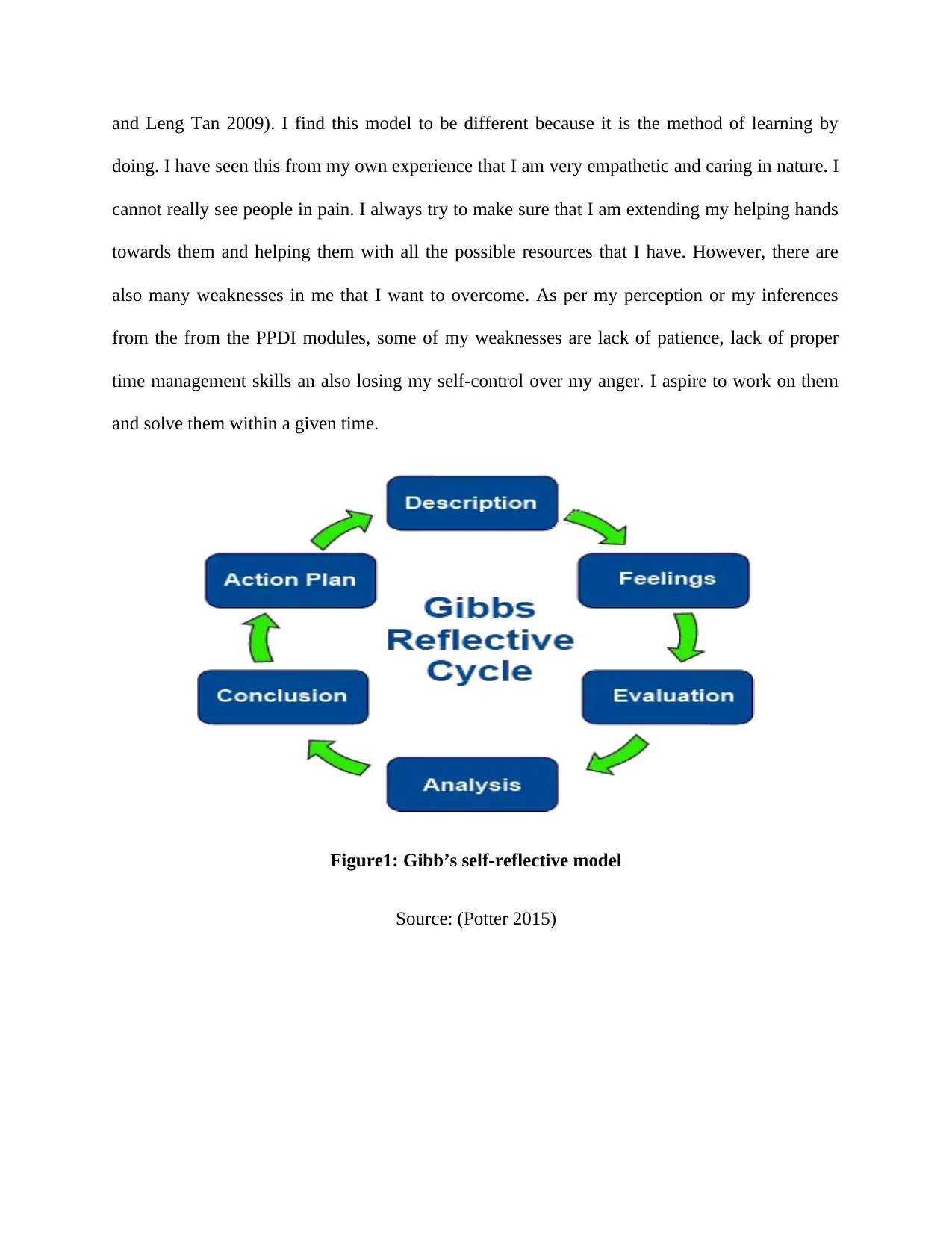
and Leng Tan 2009). I find this model to be different because it is the method of learning by
doing. I have seen this from my own experience that I am very empathetic and caring in nature. I
cannot really see people in pain. I always try to make sure that I am extending my helping hands
towards them and helping them with all the possible resources that I have. However, there are
also many weaknesses in me that I want to overcome. As per my perception or my inferences
from the from the PPDI modules, some of my weaknesses are lack of patience, lack of proper
time management skills an also losing my self-control over my anger. I aspire to work on them
and solve them within a given time.
Figure1: Gibb’s self-reflective model
Source: (Potter 2015)
doing. I have seen this from my own experience that I am very empathetic and caring in nature. I
cannot really see people in pain. I always try to make sure that I am extending my helping hands
towards them and helping them with all the possible resources that I have. However, there are
also many weaknesses in me that I want to overcome. As per my perception or my inferences
from the from the PPDI modules, some of my weaknesses are lack of patience, lack of proper
time management skills an also losing my self-control over my anger. I aspire to work on them
and solve them within a given time.
Figure1: Gibb’s self-reflective model
Source: (Potter 2015)
⊘ This is a preview!⊘
Do you want full access?
Subscribe today to unlock all pages.

Trusted by 1+ million students worldwide
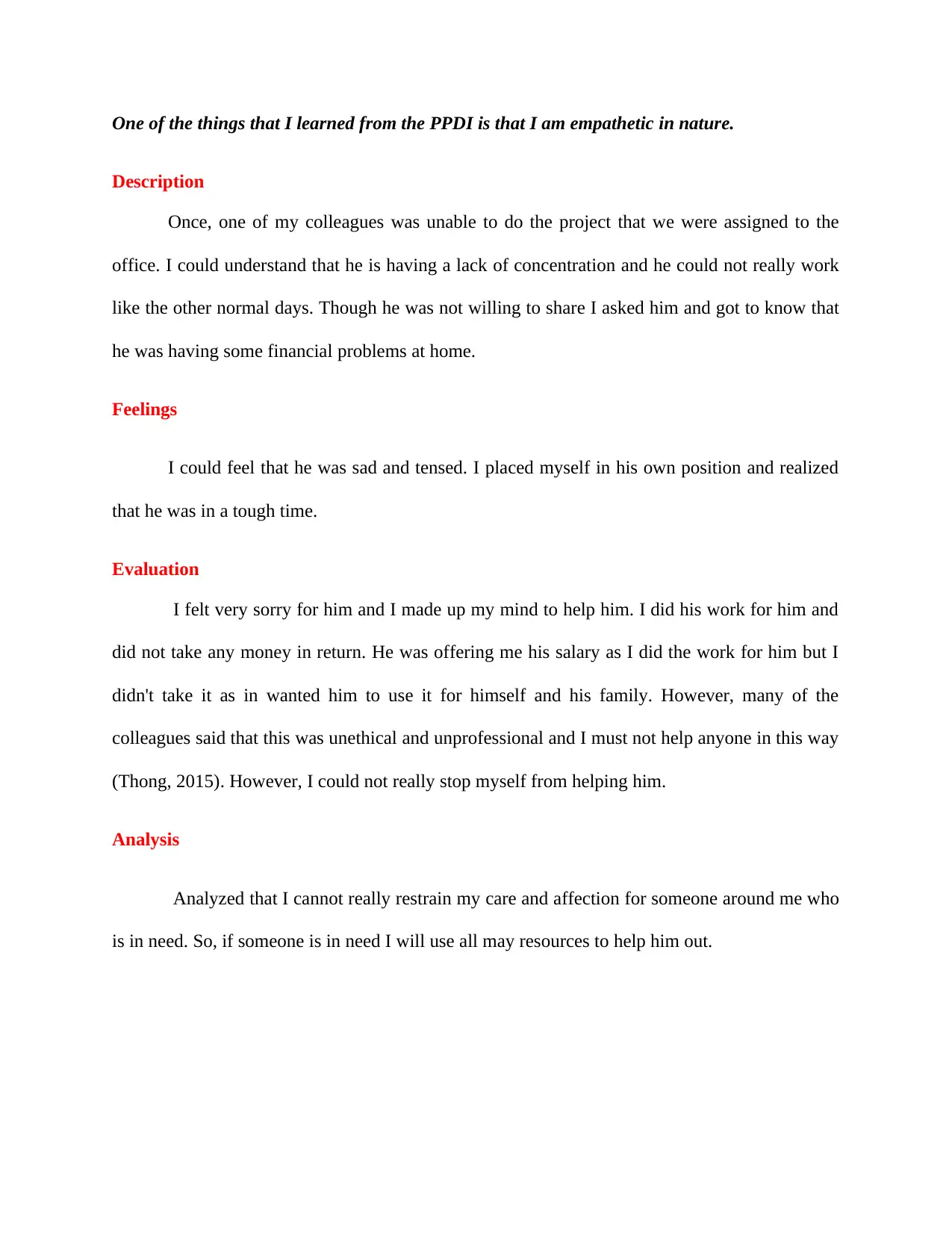
One of the things that I learned from the PPDI is that I am empathetic in nature.
Description
Once, one of my colleagues was unable to do the project that we were assigned to the
office. I could understand that he is having a lack of concentration and he could not really work
like the other normal days. Though he was not willing to share I asked him and got to know that
he was having some financial problems at home.
Feelings
I could feel that he was sad and tensed. I placed myself in his own position and realized
that he was in a tough time.
Evaluation
I felt very sorry for him and I made up my mind to help him. I did his work for him and
did not take any money in return. He was offering me his salary as I did the work for him but I
didn't take it as in wanted him to use it for himself and his family. However, many of the
colleagues said that this was unethical and unprofessional and I must not help anyone in this way
(Thong, 2015). However, I could not really stop myself from helping him.
Analysis
Analyzed that I cannot really restrain my care and affection for someone around me who
is in need. So, if someone is in need I will use all may resources to help him out.
Description
Once, one of my colleagues was unable to do the project that we were assigned to the
office. I could understand that he is having a lack of concentration and he could not really work
like the other normal days. Though he was not willing to share I asked him and got to know that
he was having some financial problems at home.
Feelings
I could feel that he was sad and tensed. I placed myself in his own position and realized
that he was in a tough time.
Evaluation
I felt very sorry for him and I made up my mind to help him. I did his work for him and
did not take any money in return. He was offering me his salary as I did the work for him but I
didn't take it as in wanted him to use it for himself and his family. However, many of the
colleagues said that this was unethical and unprofessional and I must not help anyone in this way
(Thong, 2015). However, I could not really stop myself from helping him.
Analysis
Analyzed that I cannot really restrain my care and affection for someone around me who
is in need. So, if someone is in need I will use all may resources to help him out.
Paraphrase This Document
Need a fresh take? Get an instant paraphrase of this document with our AI Paraphraser
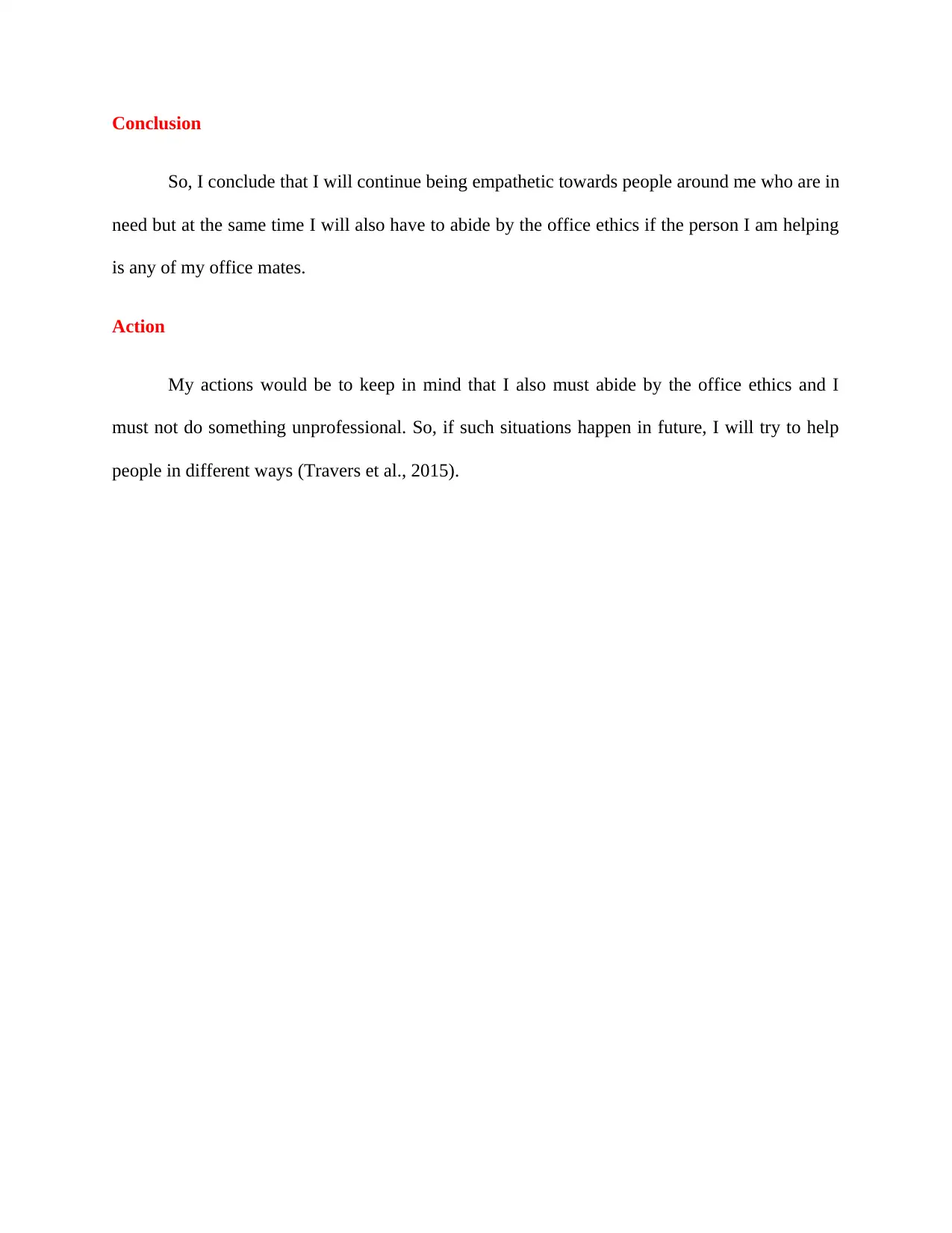
Conclusion
So, I conclude that I will continue being empathetic towards people around me who are in
need but at the same time I will also have to abide by the office ethics if the person I am helping
is any of my office mates.
Action
My actions would be to keep in mind that I also must abide by the office ethics and I
must not do something unprofessional. So, if such situations happen in future, I will try to help
people in different ways (Travers et al., 2015).
So, I conclude that I will continue being empathetic towards people around me who are in
need but at the same time I will also have to abide by the office ethics if the person I am helping
is any of my office mates.
Action
My actions would be to keep in mind that I also must abide by the office ethics and I
must not do something unprofessional. So, if such situations happen in future, I will try to help
people in different ways (Travers et al., 2015).
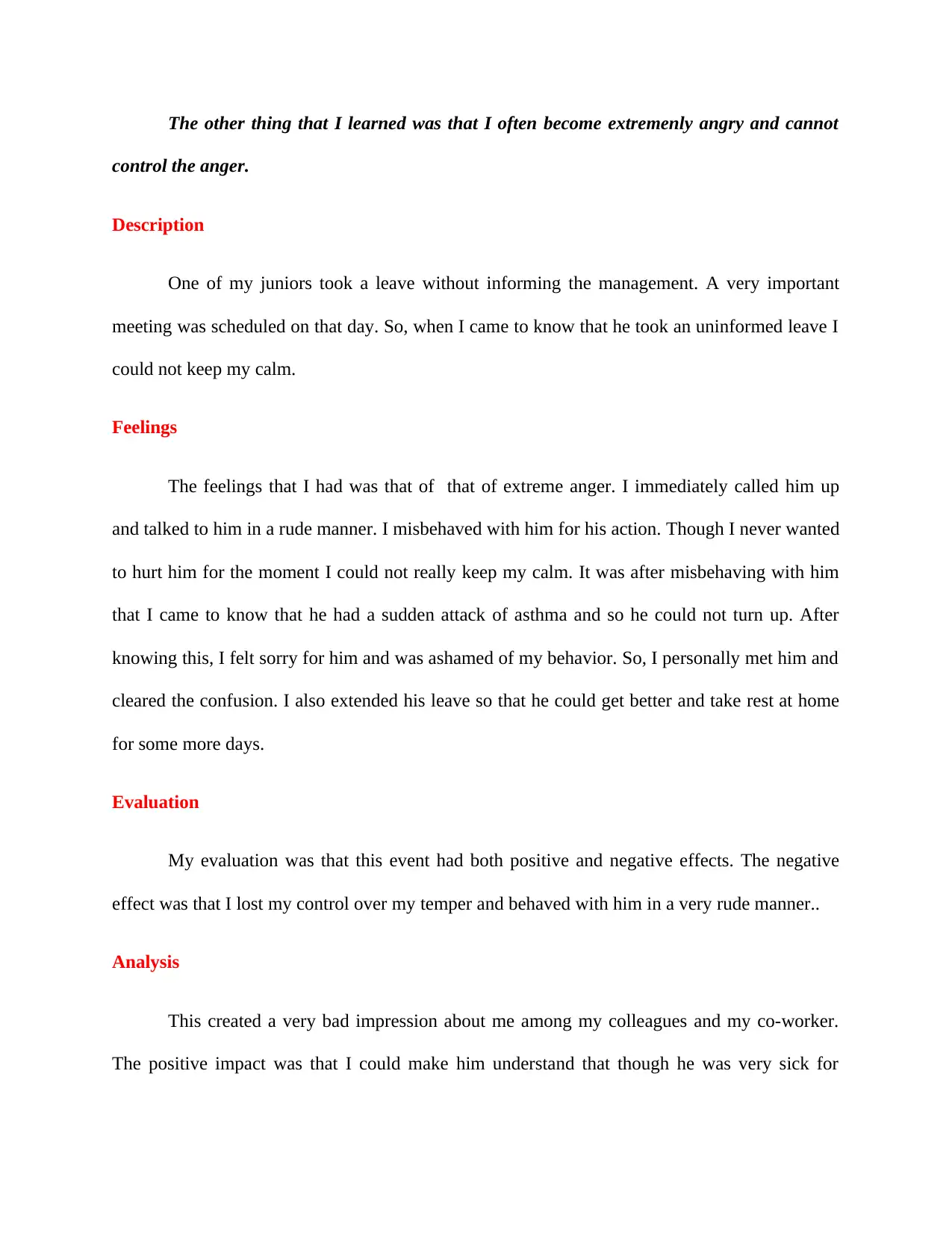
The other thing that I learned was that I often become extremenly angry and cannot
control the anger.
Description
One of my juniors took a leave without informing the management. A very important
meeting was scheduled on that day. So, when I came to know that he took an uninformed leave I
could not keep my calm.
Feelings
The feelings that I had was that of that of extreme anger. I immediately called him up
and talked to him in a rude manner. I misbehaved with him for his action. Though I never wanted
to hurt him for the moment I could not really keep my calm. It was after misbehaving with him
that I came to know that he had a sudden attack of asthma and so he could not turn up. After
knowing this, I felt sorry for him and was ashamed of my behavior. So, I personally met him and
cleared the confusion. I also extended his leave so that he could get better and take rest at home
for some more days.
Evaluation
My evaluation was that this event had both positive and negative effects. The negative
effect was that I lost my control over my temper and behaved with him in a very rude manner..
Analysis
This created a very bad impression about me among my colleagues and my co-worker.
The positive impact was that I could make him understand that though he was very sick for
control the anger.
Description
One of my juniors took a leave without informing the management. A very important
meeting was scheduled on that day. So, when I came to know that he took an uninformed leave I
could not keep my calm.
Feelings
The feelings that I had was that of that of extreme anger. I immediately called him up
and talked to him in a rude manner. I misbehaved with him for his action. Though I never wanted
to hurt him for the moment I could not really keep my calm. It was after misbehaving with him
that I came to know that he had a sudden attack of asthma and so he could not turn up. After
knowing this, I felt sorry for him and was ashamed of my behavior. So, I personally met him and
cleared the confusion. I also extended his leave so that he could get better and take rest at home
for some more days.
Evaluation
My evaluation was that this event had both positive and negative effects. The negative
effect was that I lost my control over my temper and behaved with him in a very rude manner..
Analysis
This created a very bad impression about me among my colleagues and my co-worker.
The positive impact was that I could make him understand that though he was very sick for
⊘ This is a preview!⊘
Do you want full access?
Subscribe today to unlock all pages.

Trusted by 1+ million students worldwide
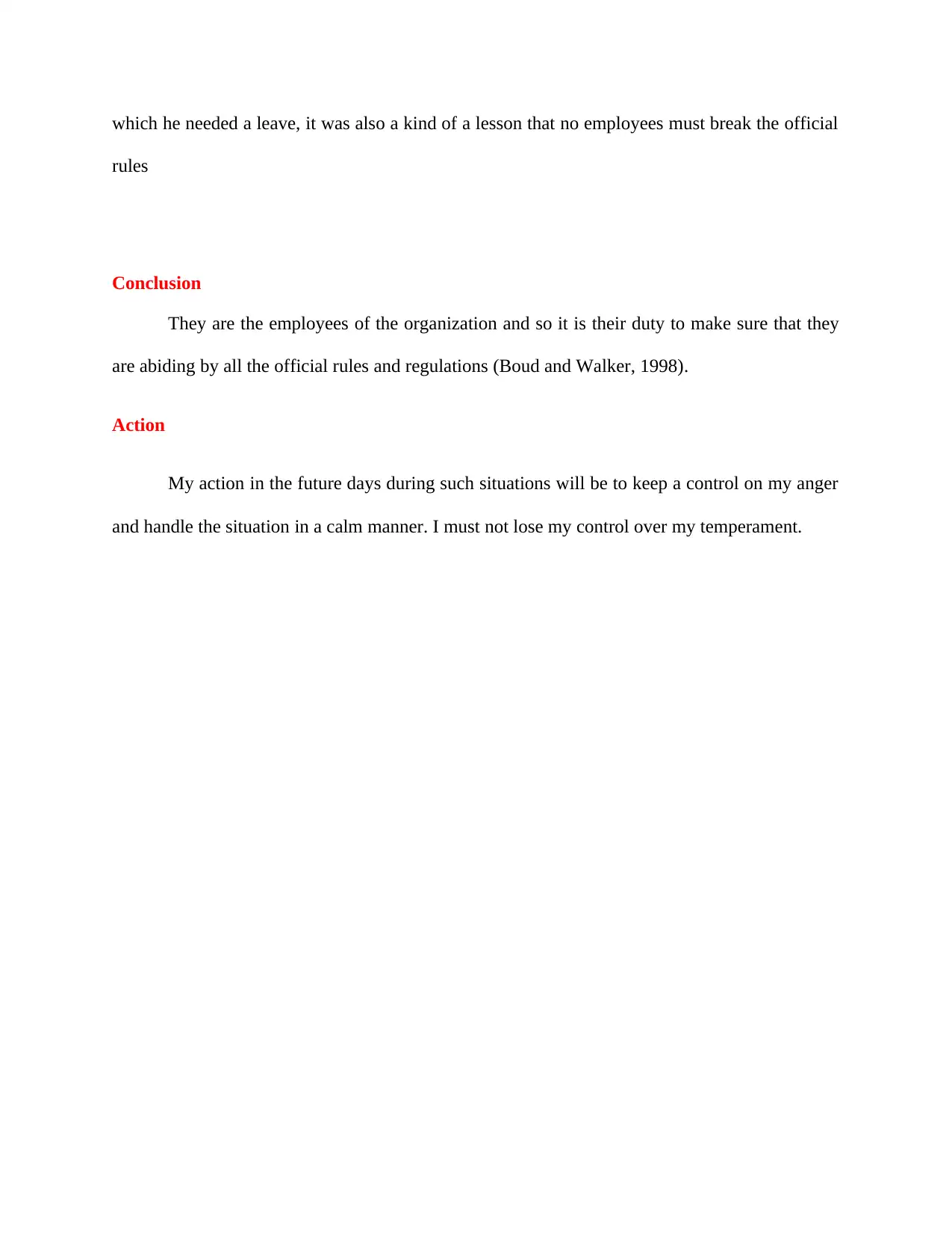
which he needed a leave, it was also a kind of a lesson that no employees must break the official
rules
Conclusion
They are the employees of the organization and so it is their duty to make sure that they
are abiding by all the official rules and regulations (Boud and Walker, 1998).
Action
My action in the future days during such situations will be to keep a control on my anger
and handle the situation in a calm manner. I must not lose my control over my temperament.
rules
Conclusion
They are the employees of the organization and so it is their duty to make sure that they
are abiding by all the official rules and regulations (Boud and Walker, 1998).
Action
My action in the future days during such situations will be to keep a control on my anger
and handle the situation in a calm manner. I must not lose my control over my temperament.
Paraphrase This Document
Need a fresh take? Get an instant paraphrase of this document with our AI Paraphraser
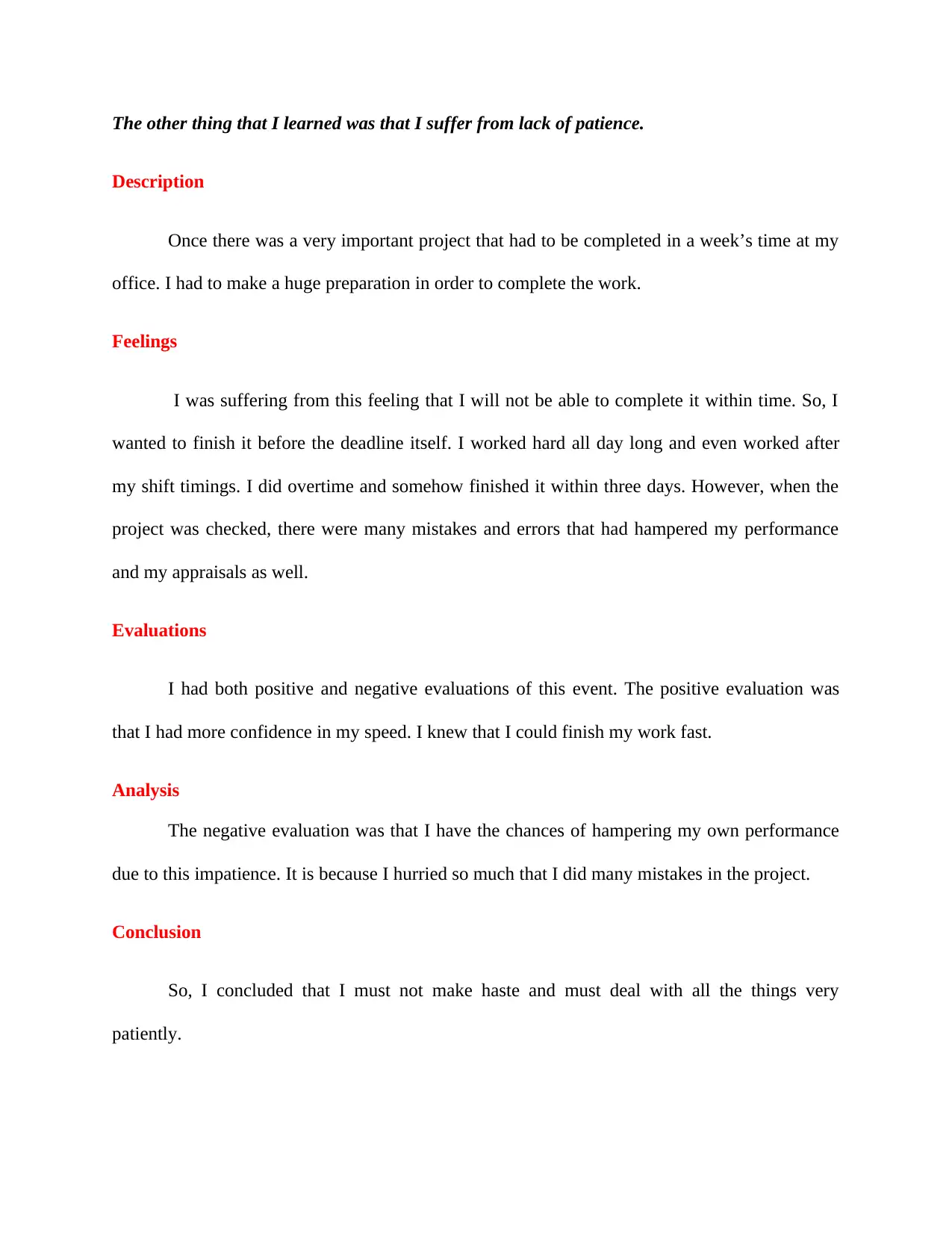
The other thing that I learned was that I suffer from lack of patience.
Description
Once there was a very important project that had to be completed in a week’s time at my
office. I had to make a huge preparation in order to complete the work.
Feelings
I was suffering from this feeling that I will not be able to complete it within time. So, I
wanted to finish it before the deadline itself. I worked hard all day long and even worked after
my shift timings. I did overtime and somehow finished it within three days. However, when the
project was checked, there were many mistakes and errors that had hampered my performance
and my appraisals as well.
Evaluations
I had both positive and negative evaluations of this event. The positive evaluation was
that I had more confidence in my speed. I knew that I could finish my work fast.
Analysis
The negative evaluation was that I have the chances of hampering my own performance
due to this impatience. It is because I hurried so much that I did many mistakes in the project.
Conclusion
So, I concluded that I must not make haste and must deal with all the things very
patiently.
Description
Once there was a very important project that had to be completed in a week’s time at my
office. I had to make a huge preparation in order to complete the work.
Feelings
I was suffering from this feeling that I will not be able to complete it within time. So, I
wanted to finish it before the deadline itself. I worked hard all day long and even worked after
my shift timings. I did overtime and somehow finished it within three days. However, when the
project was checked, there were many mistakes and errors that had hampered my performance
and my appraisals as well.
Evaluations
I had both positive and negative evaluations of this event. The positive evaluation was
that I had more confidence in my speed. I knew that I could finish my work fast.
Analysis
The negative evaluation was that I have the chances of hampering my own performance
due to this impatience. It is because I hurried so much that I did many mistakes in the project.
Conclusion
So, I concluded that I must not make haste and must deal with all the things very
patiently.
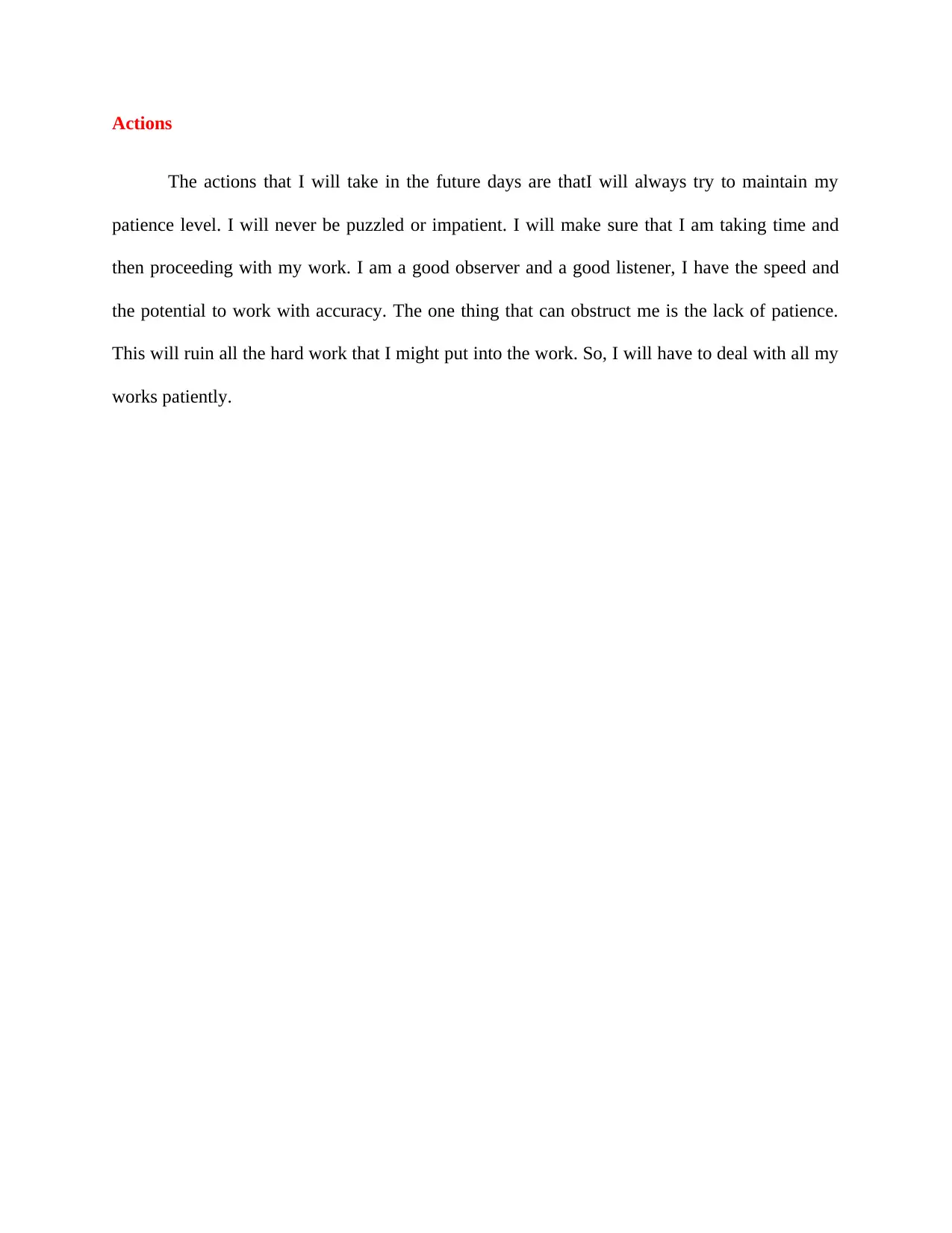
Actions
The actions that I will take in the future days are thatI will always try to maintain my
patience level. I will never be puzzled or impatient. I will make sure that I am taking time and
then proceeding with my work. I am a good observer and a good listener, I have the speed and
the potential to work with accuracy. The one thing that can obstruct me is the lack of patience.
This will ruin all the hard work that I might put into the work. So, I will have to deal with all my
works patiently.
The actions that I will take in the future days are thatI will always try to maintain my
patience level. I will never be puzzled or impatient. I will make sure that I am taking time and
then proceeding with my work. I am a good observer and a good listener, I have the speed and
the potential to work with accuracy. The one thing that can obstruct me is the lack of patience.
This will ruin all the hard work that I might put into the work. So, I will have to deal with all my
works patiently.
⊘ This is a preview!⊘
Do you want full access?
Subscribe today to unlock all pages.

Trusted by 1+ million students worldwide
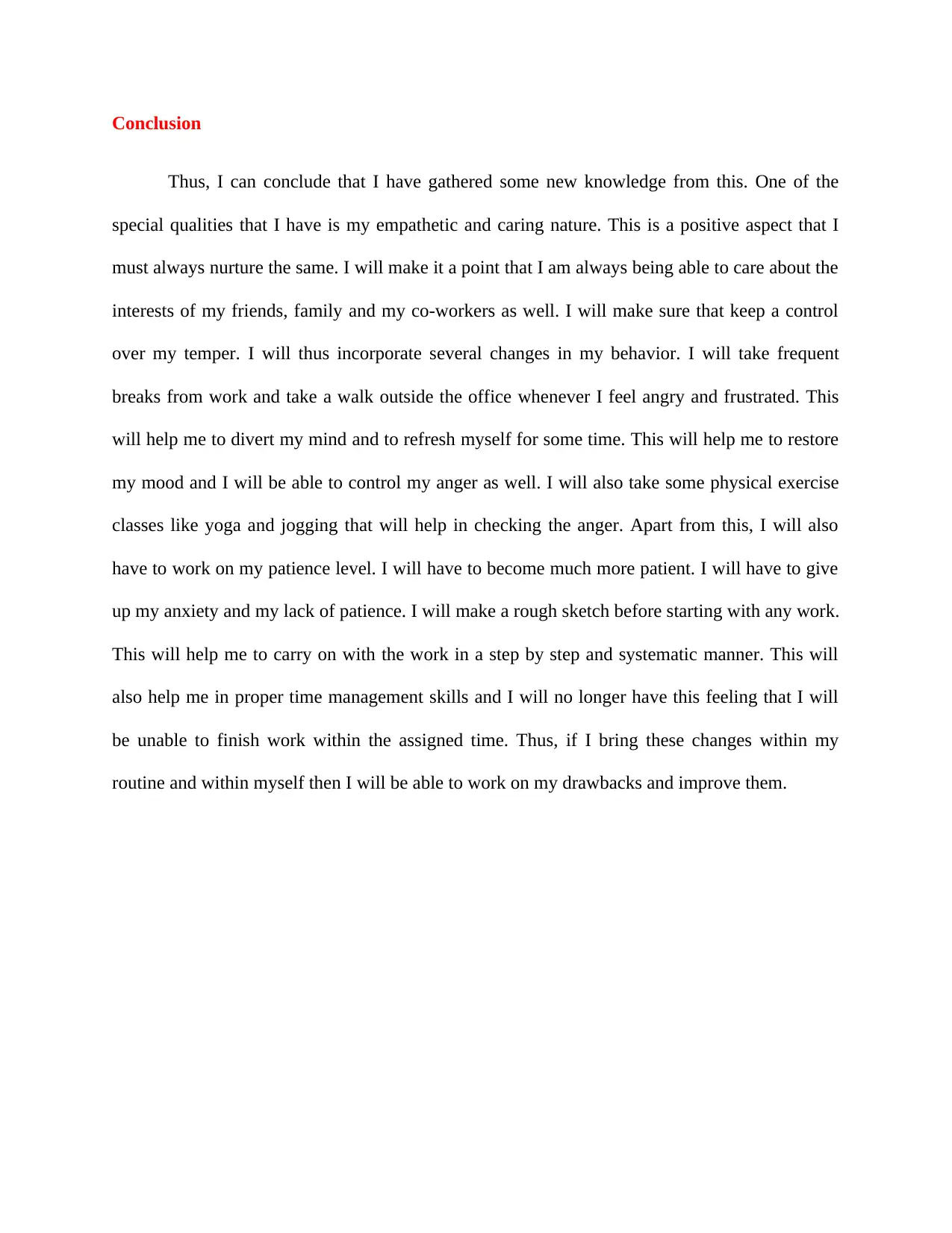
Conclusion
Thus, I can conclude that I have gathered some new knowledge from this. One of the
special qualities that I have is my empathetic and caring nature. This is a positive aspect that I
must always nurture the same. I will make it a point that I am always being able to care about the
interests of my friends, family and my co-workers as well. I will make sure that keep a control
over my temper. I will thus incorporate several changes in my behavior. I will take frequent
breaks from work and take a walk outside the office whenever I feel angry and frustrated. This
will help me to divert my mind and to refresh myself for some time. This will help me to restore
my mood and I will be able to control my anger as well. I will also take some physical exercise
classes like yoga and jogging that will help in checking the anger. Apart from this, I will also
have to work on my patience level. I will have to become much more patient. I will have to give
up my anxiety and my lack of patience. I will make a rough sketch before starting with any work.
This will help me to carry on with the work in a step by step and systematic manner. This will
also help me in proper time management skills and I will no longer have this feeling that I will
be unable to finish work within the assigned time. Thus, if I bring these changes within my
routine and within myself then I will be able to work on my drawbacks and improve them.
Thus, I can conclude that I have gathered some new knowledge from this. One of the
special qualities that I have is my empathetic and caring nature. This is a positive aspect that I
must always nurture the same. I will make it a point that I am always being able to care about the
interests of my friends, family and my co-workers as well. I will make sure that keep a control
over my temper. I will thus incorporate several changes in my behavior. I will take frequent
breaks from work and take a walk outside the office whenever I feel angry and frustrated. This
will help me to divert my mind and to refresh myself for some time. This will help me to restore
my mood and I will be able to control my anger as well. I will also take some physical exercise
classes like yoga and jogging that will help in checking the anger. Apart from this, I will also
have to work on my patience level. I will have to become much more patient. I will have to give
up my anxiety and my lack of patience. I will make a rough sketch before starting with any work.
This will help me to carry on with the work in a step by step and systematic manner. This will
also help me in proper time management skills and I will no longer have this feeling that I will
be unable to finish work within the assigned time. Thus, if I bring these changes within my
routine and within myself then I will be able to work on my drawbacks and improve them.
Paraphrase This Document
Need a fresh take? Get an instant paraphrase of this document with our AI Paraphraser
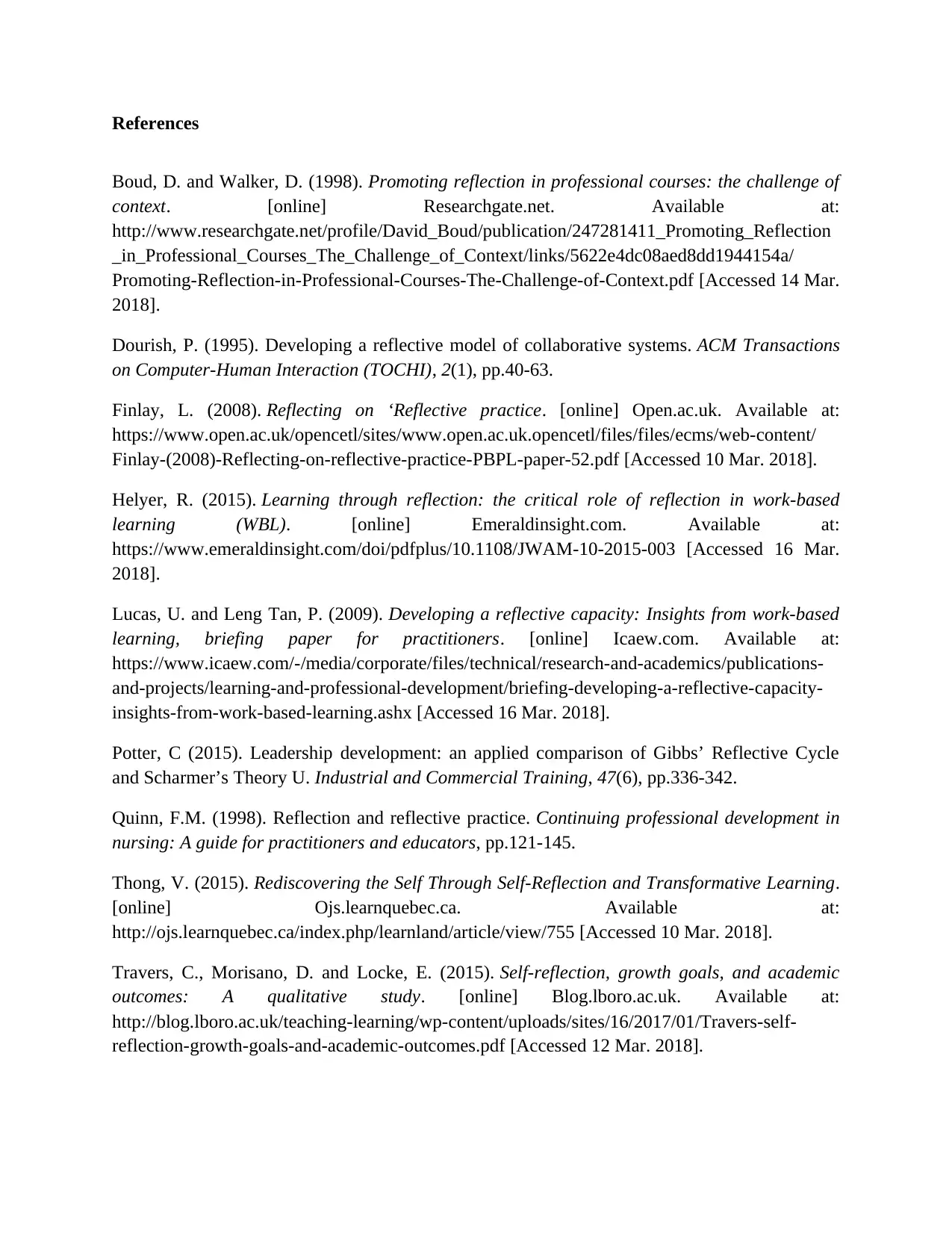
References
Boud, D. and Walker, D. (1998). Promoting reflection in professional courses: the challenge of
context. [online] Researchgate.net. Available at:
http://www.researchgate.net/profile/David_Boud/publication/247281411_Promoting_Reflection
_in_Professional_Courses_The_Challenge_of_Context/links/5622e4dc08aed8dd1944154a/
Promoting-Reflection-in-Professional-Courses-The-Challenge-of-Context.pdf [Accessed 14 Mar.
2018].
Dourish, P. (1995). Developing a reflective model of collaborative systems. ACM Transactions
on Computer-Human Interaction (TOCHI), 2(1), pp.40-63.
Finlay, L. (2008). Reflecting on ‘Reflective practice. [online] Open.ac.uk. Available at:
https://www.open.ac.uk/opencetl/sites/www.open.ac.uk.opencetl/files/files/ecms/web-content/
Finlay-(2008)-Reflecting-on-reflective-practice-PBPL-paper-52.pdf [Accessed 10 Mar. 2018].
Helyer, R. (2015). Learning through reflection: the critical role of reflection in work-based
learning (WBL). [online] Emeraldinsight.com. Available at:
https://www.emeraldinsight.com/doi/pdfplus/10.1108/JWAM-10-2015-003 [Accessed 16 Mar.
2018].
Lucas, U. and Leng Tan, P. (2009). Developing a reflective capacity: Insights from work-based
learning, briefing paper for practitioners. [online] Icaew.com. Available at:
https://www.icaew.com/-/media/corporate/files/technical/research-and-academics/publications-
and-projects/learning-and-professional-development/briefing-developing-a-reflective-capacity-
insights-from-work-based-learning.ashx [Accessed 16 Mar. 2018].
Potter, C (2015). Leadership development: an applied comparison of Gibbs’ Reflective Cycle
and Scharmer’s Theory U. Industrial and Commercial Training, 47(6), pp.336-342.
Quinn, F.M. (1998). Reflection and reflective practice. Continuing professional development in
nursing: A guide for practitioners and educators, pp.121-145.
Thong, V. (2015). Rediscovering the Self Through Self-Reflection and Transformative Learning.
[online] Ojs.learnquebec.ca. Available at:
http://ojs.learnquebec.ca/index.php/learnland/article/view/755 [Accessed 10 Mar. 2018].
Travers, C., Morisano, D. and Locke, E. (2015). Self-reflection, growth goals, and academic
outcomes: A qualitative study. [online] Blog.lboro.ac.uk. Available at:
http://blog.lboro.ac.uk/teaching-learning/wp-content/uploads/sites/16/2017/01/Travers-self-
reflection-growth-goals-and-academic-outcomes.pdf [Accessed 12 Mar. 2018].
Boud, D. and Walker, D. (1998). Promoting reflection in professional courses: the challenge of
context. [online] Researchgate.net. Available at:
http://www.researchgate.net/profile/David_Boud/publication/247281411_Promoting_Reflection
_in_Professional_Courses_The_Challenge_of_Context/links/5622e4dc08aed8dd1944154a/
Promoting-Reflection-in-Professional-Courses-The-Challenge-of-Context.pdf [Accessed 14 Mar.
2018].
Dourish, P. (1995). Developing a reflective model of collaborative systems. ACM Transactions
on Computer-Human Interaction (TOCHI), 2(1), pp.40-63.
Finlay, L. (2008). Reflecting on ‘Reflective practice. [online] Open.ac.uk. Available at:
https://www.open.ac.uk/opencetl/sites/www.open.ac.uk.opencetl/files/files/ecms/web-content/
Finlay-(2008)-Reflecting-on-reflective-practice-PBPL-paper-52.pdf [Accessed 10 Mar. 2018].
Helyer, R. (2015). Learning through reflection: the critical role of reflection in work-based
learning (WBL). [online] Emeraldinsight.com. Available at:
https://www.emeraldinsight.com/doi/pdfplus/10.1108/JWAM-10-2015-003 [Accessed 16 Mar.
2018].
Lucas, U. and Leng Tan, P. (2009). Developing a reflective capacity: Insights from work-based
learning, briefing paper for practitioners. [online] Icaew.com. Available at:
https://www.icaew.com/-/media/corporate/files/technical/research-and-academics/publications-
and-projects/learning-and-professional-development/briefing-developing-a-reflective-capacity-
insights-from-work-based-learning.ashx [Accessed 16 Mar. 2018].
Potter, C (2015). Leadership development: an applied comparison of Gibbs’ Reflective Cycle
and Scharmer’s Theory U. Industrial and Commercial Training, 47(6), pp.336-342.
Quinn, F.M. (1998). Reflection and reflective practice. Continuing professional development in
nursing: A guide for practitioners and educators, pp.121-145.
Thong, V. (2015). Rediscovering the Self Through Self-Reflection and Transformative Learning.
[online] Ojs.learnquebec.ca. Available at:
http://ojs.learnquebec.ca/index.php/learnland/article/view/755 [Accessed 10 Mar. 2018].
Travers, C., Morisano, D. and Locke, E. (2015). Self-reflection, growth goals, and academic
outcomes: A qualitative study. [online] Blog.lboro.ac.uk. Available at:
http://blog.lboro.ac.uk/teaching-learning/wp-content/uploads/sites/16/2017/01/Travers-self-
reflection-growth-goals-and-academic-outcomes.pdf [Accessed 12 Mar. 2018].
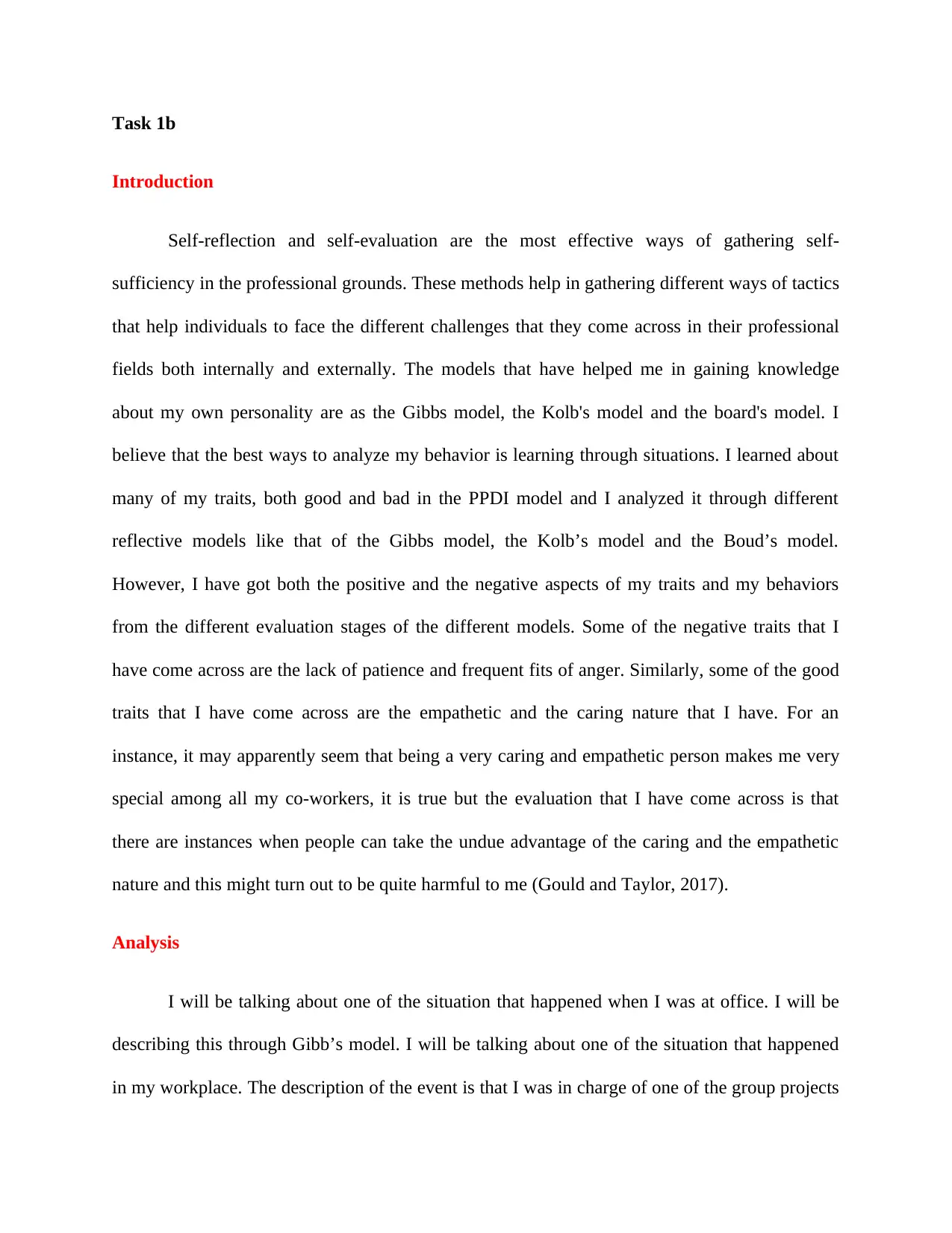
Task 1b
Introduction
Self-reflection and self-evaluation are the most effective ways of gathering self-
sufficiency in the professional grounds. These methods help in gathering different ways of tactics
that help individuals to face the different challenges that they come across in their professional
fields both internally and externally. The models that have helped me in gaining knowledge
about my own personality are as the Gibbs model, the Kolb's model and the board's model. I
believe that the best ways to analyze my behavior is learning through situations. I learned about
many of my traits, both good and bad in the PPDI model and I analyzed it through different
reflective models like that of the Gibbs model, the Kolb’s model and the Boud’s model.
However, I have got both the positive and the negative aspects of my traits and my behaviors
from the different evaluation stages of the different models. Some of the negative traits that I
have come across are the lack of patience and frequent fits of anger. Similarly, some of the good
traits that I have come across are the empathetic and the caring nature that I have. For an
instance, it may apparently seem that being a very caring and empathetic person makes me very
special among all my co-workers, it is true but the evaluation that I have come across is that
there are instances when people can take the undue advantage of the caring and the empathetic
nature and this might turn out to be quite harmful to me (Gould and Taylor, 2017).
Analysis
I will be talking about one of the situation that happened when I was at office. I will be
describing this through Gibb’s model. I will be talking about one of the situation that happened
in my workplace. The description of the event is that I was in charge of one of the group projects
Introduction
Self-reflection and self-evaluation are the most effective ways of gathering self-
sufficiency in the professional grounds. These methods help in gathering different ways of tactics
that help individuals to face the different challenges that they come across in their professional
fields both internally and externally. The models that have helped me in gaining knowledge
about my own personality are as the Gibbs model, the Kolb's model and the board's model. I
believe that the best ways to analyze my behavior is learning through situations. I learned about
many of my traits, both good and bad in the PPDI model and I analyzed it through different
reflective models like that of the Gibbs model, the Kolb’s model and the Boud’s model.
However, I have got both the positive and the negative aspects of my traits and my behaviors
from the different evaluation stages of the different models. Some of the negative traits that I
have come across are the lack of patience and frequent fits of anger. Similarly, some of the good
traits that I have come across are the empathetic and the caring nature that I have. For an
instance, it may apparently seem that being a very caring and empathetic person makes me very
special among all my co-workers, it is true but the evaluation that I have come across is that
there are instances when people can take the undue advantage of the caring and the empathetic
nature and this might turn out to be quite harmful to me (Gould and Taylor, 2017).
Analysis
I will be talking about one of the situation that happened when I was at office. I will be
describing this through Gibb’s model. I will be talking about one of the situation that happened
in my workplace. The description of the event is that I was in charge of one of the group projects
⊘ This is a preview!⊘
Do you want full access?
Subscribe today to unlock all pages.

Trusted by 1+ million students worldwide
1 out of 31
Related Documents
Your All-in-One AI-Powered Toolkit for Academic Success.
+13062052269
info@desklib.com
Available 24*7 on WhatsApp / Email
![[object Object]](/_next/static/media/star-bottom.7253800d.svg)
Unlock your academic potential
Copyright © 2020–2026 A2Z Services. All Rights Reserved. Developed and managed by ZUCOL.




